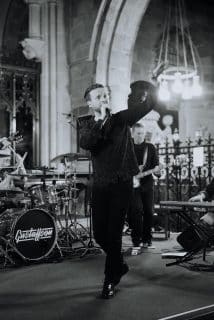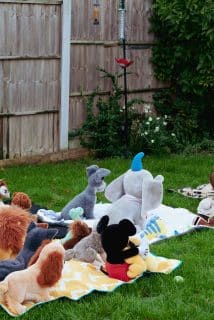The Language of Loss
Culture
Sam Griffiths from the hotly tipped band The Howl & The Hum writes about lockdown, a friend's suicide and why men must develop a new language to connect with their emotions.
“‘I’m fine, leave me alone’, goes the song of a million men”
for Lawrence, and the old gang
Suicide isn’t just a sudden absence; it’s an explosion. It scatters debris, skeletons, and unexploded shells that either never go off, or resurface later in your life.
It was a poorly-fonted, laminated pamphlet I was given when I first attended therapy, back at university after the funeral. Not quite ‘So you’re a tiny baby and your friend has killed himself, what fucking now?’ – but not far off. This was the first time I saw the words ‘mental health’ and related to them. Those words meant something to me, to my own mental health, rather than a character on TV. That moment made me aware of my own frailty as a young man, aware for the first time of my emotional state , my anxieties, and my relationship to loss.
When I was eighteen one of my closest friends took his own life, and in doing so chucked a hand grenade into our close knit group of friends.
Since then, my parents have divorced, three of my grandparents are no longer with us, and I have lost far too many friends to suicide, mental illness, and various other events that seem to follow the life of me and my schoolfriends like a badly written Lemony Snicket book.
Yet to have had that first, catastrophic, nuclear explosion happen while we were in the transition from childhood to adulthood – we were children, children – meant we had become acquainted with loss – with a soul-deep part of ourselves that only a terrible event such as this can give us access to.
*
For somewhere I remember as being so masculine, loud, and testosterone-fuelled, there was always an odd silence at the all-boys secondary school we attended. We loved our own abysmal opinions about music, TV, films, sports, and girls, but no-one could really express their emotional state, despite our ‘emo’ phases. ‘Depressing’ was a word associated with My Chemical Romance and The Archers. We listened to Radiohead and Elliott Smith, deaf.
This is the part where cliché would have me say, ‘usually you’d be called a “wuss” or a “pussy” or some effeminate insult, or warded off the subject through fear of being socially excluded’, but that wouldn’t be true. There was simply no dialogue to be had, no dialect to have it in. To put it plainly, we didn’t have the language or capabilities to be able to talk about our emotional states at school. You couldn’t mention that you couldn’t sleep, or that you were sleeping for fourteen hours a day, or that every time you looked in the mirror you felt like you were inching away from the person within it, while also quoting Family Guy and Anchorman and discussing the gracious fall of the WWE’s Attitude Era, because these languages felt incompatible. Emotion couldn’t exist there, there was no beat or pause or breath within which you could open up, bear anything to anyone. Really, we were walking time bombs with no outlets, fizzing and sparking and bumping into the bubble of teenage-hood and waiting for something to tip us into oblivion.
Ours was a great school, which involved a lot of academic stress. We studied French, German, even fucking Latin and Ancient Greek, yet vulnerability and emotional accessibility were languages we didn’t speak, weren’t taught to speak, and I don’t remember ever having access to someone I could speak to. I still can’t speak any fucking Latin.
However, my heart is filled when I talk to people of this age today. Young men and women seem to be far more in touch with their mental health than I was before I lost my friend. A focus on mental health has been prevalent in the news, on social media, and in popular media such as music, films and TV. This changing attitude to mental health gives me hope for young people: as soon as we have access to a language of loss, a language of depression and its irrationalities and dips and dives, then we are already resurfacing from it.
In retrospect, the hardest thing I ever had to do was get through the fallout of my friend’s suicide, and the one thing I never got to accomplish was saying, out loud, ‘I miss you, mate’. The absence felt like a weakness, as if it were my own fault that something was gone. Like a song where you can never quite make out the lyrics, I never knew the words. I say ‘in retrospect’ because it is with relief and gratitude and pride that I now can look back saying, ‘that was an ocean no-one should have to cross, but me and my friends did it’. This journey was a lesson in a vernacular, in which we found this language of loss within ourselves, and I am proud to know, from reading their stories, that many of the people I went through this experience with are so fluent in themselves, and so fluent in their adjustment to loss that it has made them incredible human beings, ones who not only survived an explosion, but conquered it.
During this pandemic, it’s arguably more important than ever to be in touch with our mental health. Young people’s futures are being distorted and thrown into the air by the lockdown, and it is severely affecting their emotional wellbeing, harder than I was ever hit.
However, as the cliché goes, ‘there is a light at the end of the tunnel’, a light to be shone on a darkness it sometimes seems easier to ignore, and sometimes easiest to never learn how to discuss. Language is that light: throw it upon the dark, and stare down the present, understandable ecstasy of life.
The Howl & The Hum’s debut album, Human Contact, is out on 29th May.

Join The Book of Man
Sign up to our daily newsletters to join the frontline of the revolution in masculinity.



















